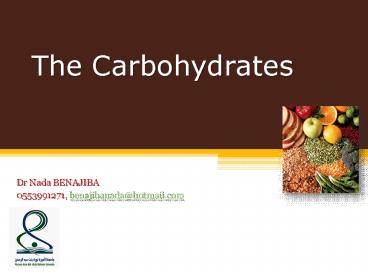The Carbohydrates - PowerPoint PPT Presentation
Title:
The Carbohydrates
Description:
Title: No Slide Title Author: Eugene J. Fenster Last modified by: user Created Date: 12/13/2003 9:06:08 PM Document presentation format: Affichage l' cran (4:3) – PowerPoint PPT presentation
Number of Views:49
Avg rating:3.0/5.0
Title: The Carbohydrates
1
The Carbohydrates
Dr Nada BENAJIBA 0553991271, benajibanada_at_hotmail
.com
2
Definition
- Are neutral compounds of carbon, hydrogen and
oxygen - Chemical formula (CH2O)n
- Basic fuel source (energy) sources because of
- Their availability
- Their relatively low cost
- Their storage capacity.
3
Classification
- Simple carbohydrates
- Monosaccharide
- Disaccharide
- Complex carbohydrates
- Glycogen
- Starch
- Fibers
4
Simple Carbohydrates Monosaccharides C6H12O6
Basic currency of energy in the body
5
Condensation
6
Hydrolysis
7
Disaccharides
8
Oligosaccharides
- Components of cell membranes
- Humans lack enzymes to digest oligosaccharides
causing bloating, cramps, gas - Sources dried beans, soybeans, peas, lentils
9
Complex Carbohydrates Polysaccharides
10
Dietary Fiber
- Not digestible
- Poor fiber in diet ? Body takes water out of
waste gt dry and hard waste ? Constipation
Hemorrhoids - Important in health promotion and disease
prevention ? Many health organizations recommend
increasing intake of dietary fibers - Divided into two groups based on solubility
- Soluble fibers Viscous Fermentable
- Insoluble fibers Non-viscous
11
Viscous Fibers
12
Viscous Fibers
13
(No Transcript)
14
(No Transcript)
15
(No Transcript)
16
Digestion
17
Absorption
18
Constancy of Blood Glucose insulin and glucagon
19
Constancy of Blood Glucose
20
Constancy of Blood Glucose
21
Carbohydrate Metabolism
- Storing glucose as glycogen
- Using glucose for energy
- Making glucose from protein
- Gluconeogenesis
- Protein-sparing action of carbohydrates
- Making ketone bodies from fat fragments
- Ketone bodies ? Ketosis ? affects acid-base
balance - Converting glucose to fat
- Energetically expensive
22
Constancy of Blood Glucose
23
Constancy of Blood Glucose Glycemic response
and Glycemic index
- The glycemic response refers to how quickly
glucose is absorbed after a person eats, how high
blood glucose rises, and how quickly it returns
to normal. - A low glycemic response Slow absorption, a
modest rise in blood glucose, and a smooth return
to normal ? good for health - A high glycemic response Fast absorption, a
surge in blood glucose, and an overreaction that
plunges glucose back to normal ? not good for
health - Different foods have different effects on blood
glucose.
24
Constancy of Blood Glucose
- Glycemic response
- Glycemic index
25
Lactose Intolerance
- As people age, upward of 75 of the worlds
people lose the ability to produce the enzyme
lactase which digests lactose ? Lactase
deficiency - Symptoms after consuming lactose-containing
products - Nausea
- Pain
- Diarrhea
- Excessive gas
- Often people overestimate the severity of their
lactose intolerance - Alternatives include
- Lactose-free milk
- Cheese
- Yogurt
- Calcium-fortified juices, soymilk, canned
sardines
26
RDA Starch and Fiber
- RDA for carbohydrate
- 130 g/day
- 50-55 total daily energy intake
- Sugars No more than 25 of total daily energy
intake - Daily Value 300 g/day
- Fiber
- Daily Value 25 g/day
- AI 14 g/1000 kcal/day
27
Health effects of sugars ? Nutrient deficiencies
28
Sugars
- Health effects of sugars
- Dental caries
- Dental plaque
29
Accusations against Sugars
- Sugar causes
- Obesity
- heart disease
- misbehavior in children and criminal behavior in
adults - cravings and addictions
30
Guidelines to Groceries
- Grains
31
Alternatives to Sugar Sweeteners
- Consumed in order to control
- weight gain by reducing calories intake
- blood glucose,
- dental caries
- Different sweetners
- Artificial sweeteners nonnutritive sweeteners
because they provide virtually no energy - Stevia herbal products from a plant whose
leaves is now be used as an additive in a
variety of foods and beverages - Sugar alcohols provide bulk and sweetness in
cookies, hard candies, sugarless gums, jams, and
jellies.
32
(No Transcript)
33
Alternatives to Sugar
34
(No Transcript)
35
(No Transcript)































